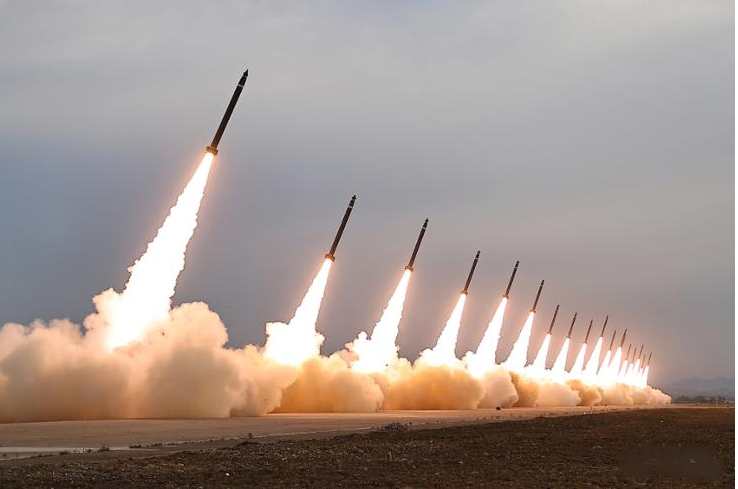
Table of Contents
North Korean Missile Launches: A Heightened Global Concern
Introduction
In recent years, North Korea’s missile launches have increasingly captured the attention of the international community, raising alarms about the potential for conflict and the implications for global security. As the North Korean regime, led by Kim Jong-un, demonstrates its growing military capabilities through a series of provocative missile tests, the urgency for diplomatic intervention and robust security measures becomes ever more apparent. These developments not only affect regional stability in East Asia but also have far-reaching consequences for international relations and global peace.
Recent Developments
North Korea’s missile program has seen significant advancements, particularly in the testing of intercontinental ballistic missiles (ICBMs) and submarine-launched ballistic missiles (SLBMs). The country has conducted multiple tests in 2023 alone, showcasing its ability to strike targets far beyond its borders. For instance, a notable test on October 31 involved the launch of an ICBM, which experts believe could potentially reach the mainland United States. Such capabilities, combined with North Korea’s development of SLBMs, underscore the increasing sophistication of its missile technology.
These missile tests are part of a broader strategy by the North Korean regime to assert its power and deter perceived threats from the United States and its allies. The tests often coincide with military exercises conducted by South Korea and the U.S., which North Korea views as direct provocations. In response, Pyongyang has consistently reiterated its commitment to strengthening its defense capabilities, emphasizing that these missile launches are crucial for the nation’s sovereignty and securityl Responses
The international response to North Korea’s missile tests has been swift and multifaceted. The United States, South Korea, and Japan have ramped up their military cooperation, conducting joint exercises aimed at demonstrating their readiness to respond to any aggression from the North. These drills are not only a show of force but also a means of reinforcing security commitments to regional allies. In particular, the U.S. has emphasized its “ironclad” defense commitments to South Korea and Japan, indicating that it would respond decisively to any attacks .
Moreover, dipddress North Korea’s missile program have been complicated by the regime’s unwillingness to engage in meaningful negotiations. Previous talks aimed at denuclearization have stalled, with North Korea demanding concessions before agreeing to further dialogue. As a result, the possibility of a military confrontation remains a concern, particularly if miscalculations occur during heightened tensions .
North Korea’s Justificationsies its missile tests as essential measures for national defense. The regime claims that these actions are necessary to protect the country from external threats, particularly from the U.S. and its allies, which it views as aggressive forces attempting to undermine its sovereignty. State media in North Korea frequently portrays missile tests as achievements that demonstrate the strength and resilience of the nation, serving both as a propaganda tool and a means of consolidating internal support for Kim Jong-un’s leadership .
This narrative of victimhood is central to North lowing the regime to rally its population around a common cause and deflect criticism from the international community. By framing its missile program as a defensive necessity, North Korea seeks to legitimize its military expenditures and the oppressive measures it enacts against dissent within the country .
Implications for Global Security
The implications of North Korea tests extend far beyond the Korean Peninsula, creating a complex web of security challenges that affect diplomatic relations globally. The ongoing missile tests exacerbate tensions in East Asia, prompting neighboring countries to bolster their defense strategies. South Korea, in particular, has increased its military readiness and invested in advanced defense systems, such as the THAAD missile defense system, to counter potential threats from the North .
Additionally, the situation complicates international efforts to achieve a po the North Korean crisis. The stalled diplomatic process has left the global community grappling with how best to respond to the regime’s provocations without escalating tensions further. The potential for miscalculation or an accidental conflict is a looming concern, particularly given the unpredictable nature of North Korea’s leadership and its military strategies .
Conclusion
The situation surrounding North Korea’s missile launches represents a critical necessitating a nuanced approach that balances diplomacy and defense. As North Korea continues to advance its missile capabilities, the international community must remain vigilant and proactive in addressing this issue. The stakes are high, and the potential for conflict underscores the importance of sustained diplomatic efforts aimed at fostering dialogue and reducing tensions in the region. Maintaining peace and stability in East Asia remains a priority for all involved parties, as the ramifications of North Korea’s actions could have profound consequences for global security.
For more detailed information, you can check sources like BBC and The Diplomat.
